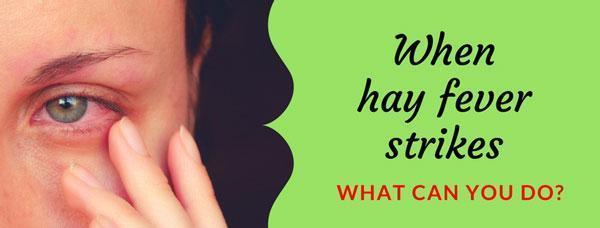It’s coming on to that time of the year when hay fever starts appearing, late this year due to the inclement weather, it is forecast that there will be a massive rise in sufferers this month.
So, if you are one of the unlucky people who suffer from the ‘not to be underestimated’ symptoms of this allergic reaction what can you do about it?
Hay fever can present itself in many ways. It can range from a little sniffle to a facial pain and a loss of your sense of smell. For our patients, it is the annual battle of how it affects their vision so this year, we thought we would try and get ahead of the game and give you some well tested solutions to the itchy and runny eye problem and give you some ideas of how you can control it.

Handy tips to control hay fever
It’s true that wearing sunglasses really is a great way to prevent your eyes from really kicking off at the first sign of a plant in full bloom! Wraparound sunglasses can act as a barrier to prevent the sticky pollen or spores from entering your eyes. Of course this won’t save you from the lovely bunch of flowers your kind friend sent you to say thank you!
Pollen is generally released at the beginning of the day between 8–10 am and early evening between 5-7 pm. This is because that is when the air is warming up and cooling down.
If you suffer from hay fever you may want to think carefully about your holiday destination. It is usually best to avoid damp humid tropical climates as they are a haven for mites, mould and pollen. A trip to the seaside often offers suffers the best reprieve, being located around bays and having mild temperatures mean they are low on allergens and pollen.
If you usually wash your hair in the morning you could try changing the routine so that you wash it at night. Pollen is sticky and loves to attach itself to your hair. When you lie down and rest your head on the pillow you are also allowing pollen to rub off and into your eyes as you sleep at night. Many of us wake up with sore itcky eyes in the morning and this is one reason why. Worse than that – next day you go and put your head on the same pillow and repeat the exercise until it is bed linen washing day; so much easier to wash your hair than the bed every day!
Your furry friends love nothing better than to be outside enduring a good walk on the grass, weaving in and out of flower beds and then rolling on your carpet, jumping on your laps or begging for a stroke. They are the perfect carriers of pollen into your home and whilst you love them, you do have to think about what you can do to minimise the risk of increasing your allergic reactions. So, consider a HPEA high–efficiency particulate air filter to trap the allergens before they reach your eyes. Some vacuum cleaners also have these filters fitted.
Imagine just how much sticky pollen love shoes! Give them a good wipe and keep them on a matt out of your main living room to keep problems at bay.
Products that can help control your hay fever symptoms
There are quite a few products available to help you control the symptoms if you start feeling the effects.
This is the product that many reach for when their symptoms arrive and they effectively block the action of the chemical histamine which causes the irritation. It can also be taken as a preventative but as with every drug they do have side effects and you should check the package instructions carefully. The main side effect is often drowsiness and you can find more information about these drugs here:
These can be useful if you get a blacked nose due to inflammations- they help reduce the swelling of blood vessels in the nose.
As we have mentioned previously, pollen is sticky and when it is swept into our eyes we create tears to flush them out. Ironically this action also reduces the quality of our tears meaning that they still feel dry and sore; it’s a vicious circle.
Ocular lubricants such as Hyabak preservative free drops ; its formulation reduces redness and provides natural relief for a mild eye irritation and can also be used by contact lens wearers who suffer from hay fever.
Smearing allergy gels or balms inside your nostrils can help as a barrier. Apply it before leaving home and regularly during the day if you blow your nose or sneeze.
Make up has a habit of dissolving and making you look a lot worse as it adds to the irritation of itchy eyes. Using hypo-allergenic cosmetics can help to reduce extra irritation and the panda eye look!
It’s worth mentioning that if eyes are particularly bad we specialise in prescribing anti- allergy eye drops which can work wonders to relieve symptoms.
Hay fever is a tough challenge for many and we hope these tips will help you cope with the sudden expected onslaught; I can feel my eyes itching just thinking about this!
Sarah Farrant
